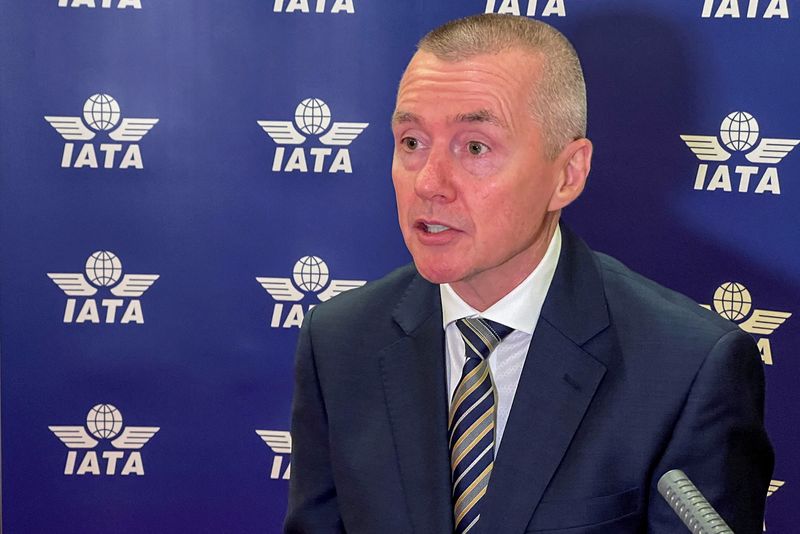By Tim Hepher and Alexander Cornwell
DOHA (Reuters) -Global airlines battered by COVID-19 seem confident of narrowing their losses but still face challenges such as labour shortages at airports which could restrict post-crisis growth, industry executives at a summit in Doha said.
Recent flight delays and cancellations have been widely blamed on a lack of staff as an increasing number of people desert low-paid airport work for flexible working practices that prospered during the pandemic.
The head of host airline Qatar Airways, Akbar Al Baker, said labour shortages will be a big challenge in the coming months, though he added that his airline is "inundated with job applications".
"People got into a bad habit of working from home," Al Baker told a news conference.
"They feel they don't need to go to an industry that really needs hands-on people," he said, adding shortages in airport staff could hurt growth.
Emirates airline President Tim Clark said the Dubai carrier had been told by authorities at London Heathrow to axe an A380 flight there at short notice at the weekend, resulting in disruption.
But he urged the industry not to waste time bickering.
"The airport side of things have got to sort out their labor supply in critical areas of baggage, check-in, baggage systems. Get on with the job. There's a lot of the blame game, everybody at each other's throats ... Guys, just get the job done."
Clark added: "Do I see this sorting itself out over the next few months? Yes"
JetBlue Airways (NASDAQ:JBLU) Corp CEO Robin Hayes, speaking about industry labour shortages on a panel in Doha, said he is confident that the industry will get back to "a new normal" over the next two to three years.
Global airlines went on the offensive at the summit, criticising governments and airports over their handling of the recovery from the pandemic.
"The cost of government mismanagement was substantial. It devastated economies, disrupted supply chains and destroyed jobs," Willie Walsh, director general of the International Air Transport Association, told the sector's annual meeting of more than 100 airline bosses.
Airlines have themselves been under fire from governments and consumer groups for disruption as travel demand resumes more briskly than expected, but the airline industry sees a common thread in uncoordinated government responses to the crisis.
"There was one virus, but each government invented its own methodology," Walsh told the conference. "How can anybody have confidence in such a shambolic, uncoordinated, and knee-jerk response by governments?"
'NOT THE RIGHT RESPONSE'
IATA's Walsh cited research showing that border closures had barely arrested the spread of the pandemic while virtually halting international travel and crippling economies.
"Closing borders is not the right response to a pandemic," Walsh said.
Governments worldwide lent more than $200 billion of support to airlines to curb bankruptcies during the pandemic, according to UK-based aviation consultancy Ishka.
Airlines expected to narrow losses in 2022 and may make a profit next year as air travel recovers, IATA said. Walsh said he was "not concerned" about the current demand and supply environment.
Korean Air Lines Co Ltd's chief executive said he is concerned that rising interest rates and inflation could impact consumer demand and that rising competition could lower ticket prices. The high U.S. dollar is "painful" and makes debt costs higher, he added.
United Airlines addressed the issue of fuel prices, with its Chief Executive Scott Kirby (NYSE:KEX) saying he expected them to stay high in the long term.
Speaking to reporters, he added that based on current prices the airline's fuel bill would total $12 billion this year.
Walsh said confused government policies had worsened disruption seen particularly in Europe as flying restarted.
Britain has criticised airlines for delays and called on the industry to refrain from overbooking flights they can't operate.
Airlines and airports frequently spar at the industry's major gatherings, with government interests and jobs at stake.
Walsh, who built a reputation as a bruiser in clashes with unions and governments as former head of British Airways, rallied under-pressure CEOs with an attack on the practice of hiking airport fees to recoup revenues lost during the crisis.

"Try that in a competitive business. 'Dear Valued Customer, we are charging you double for your coffee today because you could not buy one yesterday'. Who would accept that?" he said.
Airports have said they are unfairly criticised by airlines and called on them to focus on resolving their own problems.